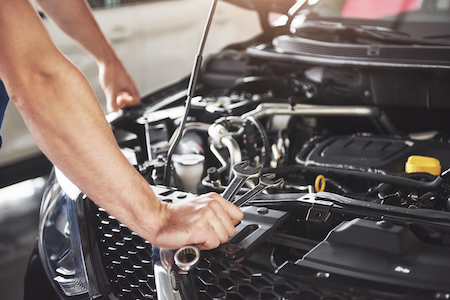A car is comprised of over 10,000 components working together to provide you with reliable transportation. If it’s well cared for, it will continue running indefinitely. That’s why car manufacturers recommend regular tune ups to keep their vehicles operating at their best.
But what does that mean? The concept of a regular tune up is a bit vague. It can mean one thing to one driver, and have a completely different meaning to someone else.
What is a tune up?
When you bring in your car for a tune up, it will move through two processes: an inspection and servicing.
The inspection process starts with a visual check of all the major components of the vehicle. A mechanic will determine how well the engine is performing by inspecting the spark plugs, air filters, oil and coolant levels. They will assess the fuel system by making sure the fuel filter is clean and unclogged.
If a mechanic sees any potential problem, the inspection process can grow from there to assess other systems and ensure they are operating well.
The tune up service depends on the results of the inspection. Every tune up process will be different, with recommendations made based on what is found. The goal is to ensure the engine operates properly, receives the right amount of fuel and oil, and functions well based on the current road conditions. Suggestions for servicing might be as simple as adding coolant, to more complex issues that require replacing various parts of the system.
Typically, a mechanic runs through a series of tests to find potential problems before they escalate. The most common parts replaced after an inspection include:
- Fluids – cars operate well if the fluids are topped off and in good condition. Mechanics often recommend replacing or topping off motor oil, coolant, transmission fluid, or power steering fluid after a thorough check.
- Filters – a filter’s job is to keep contaminating particles from entering a system. Once a filter is dirty or compromised, it can no longer do its job effectively. If a mechanic notices a dirty filter, changing out may be an easy solution to the problem.
- Belts and hoses – belts and hoses keep your car operational. It’s how power moves through the various components to keep your car running well. Cracks, leaks, and other damage can compromise the working condition of the various systems underneath the hood.
- Ignition – this includes the electrical components of your vehicle, including spark plugs, wires, and coils.
Warning signs your car needs a tune up
Cars rarely fail without indicators far in advance. It’s your job to notice transitions in the way your vehicle is operating, and bring your car in for servicing before things move from bad to worse.
Luckily, there are built in warning signs that alert you to potential problems.
Dashboard lights – today’s vehicles are technologically advanced, and can easily alert you to potential problems before they grow. Every dashboard light tells you your vehicle is operating outside of “normal.” It gives you a chance to bring it in for servicing before it gets worse. An engine light can mean many things. A tune up will get to the root cause, and fix the problem quickly.
Brakes – the brake system is one of the most vital. If you notice squeaks when you apply the brakes, or the pedal feels a bit spongy as you apply pressure, it’s time to bring your vehicle in for inspection.
Fuel economy – with every fill up, pay attention to the gas mileage you got for that tank of gas. If you notice changes in gas mileage without a solid reason, it could be that your vehicle isn’t processing the gas as efficiently as when it was new. That can impact the way the engine performs, as well as effect the emissions being released every time you drive.
Stalling – as you apply pressure to the accelerator, does the car lag, jump, work to catch up with your demands? This can put you in a dangerous situation on a busy road, and continue causing damage underneath the hood.
Vibrations – whenever your vehicle shifts in ways it normally doesn’t, shakes as you drive, or hesitates, it’s a sign there’s a problem within the system. To stay safe, a tune up can find out what’s wrong.
While it’s important to bring your vehicle in for a tune up if you notice something not working right, it’s equally important to do so regularly. Manufacturers make recommendations based on the way your vehicle was constructed to ensure it continues working well throughout the life of the vehicle.
Modern vehicles only need tune ups every 30,000 to 100,000 miles. If you’re not sure about your vehicle, check the owner’s manual for more details. It’s best to stick with a plan to ensure a long life for your car.
What a car tune up includes
When you bring your car in for servicing, it typically will include:
- Filter replacement
- Change out spark plugs
- Replace all worn components
- Preventative maintenance
- Fluid replacement
- Examining the electrical connections
- Repairing and replacing belts, hoses, and wires
If you stick with a regular maintenance plan, your tune up should be uneventful, with updates to the needed components.
Maintenance is the key to keeping your car well conditioned for as long as you own your vehicle.
Still have questions about the best care for your car?
We’re here to help.
To keep your car in good working condition, it’s important to pay attention to how well your vehicle operates from day to day. When you notice changes, it’s time to bring it in and have it inspected. It can help you stay safe in all driving conditions, and catch potential problems early to keep repair bills to a minimum.
When was the last time you scheduled a tune up for your car? Do it today.

